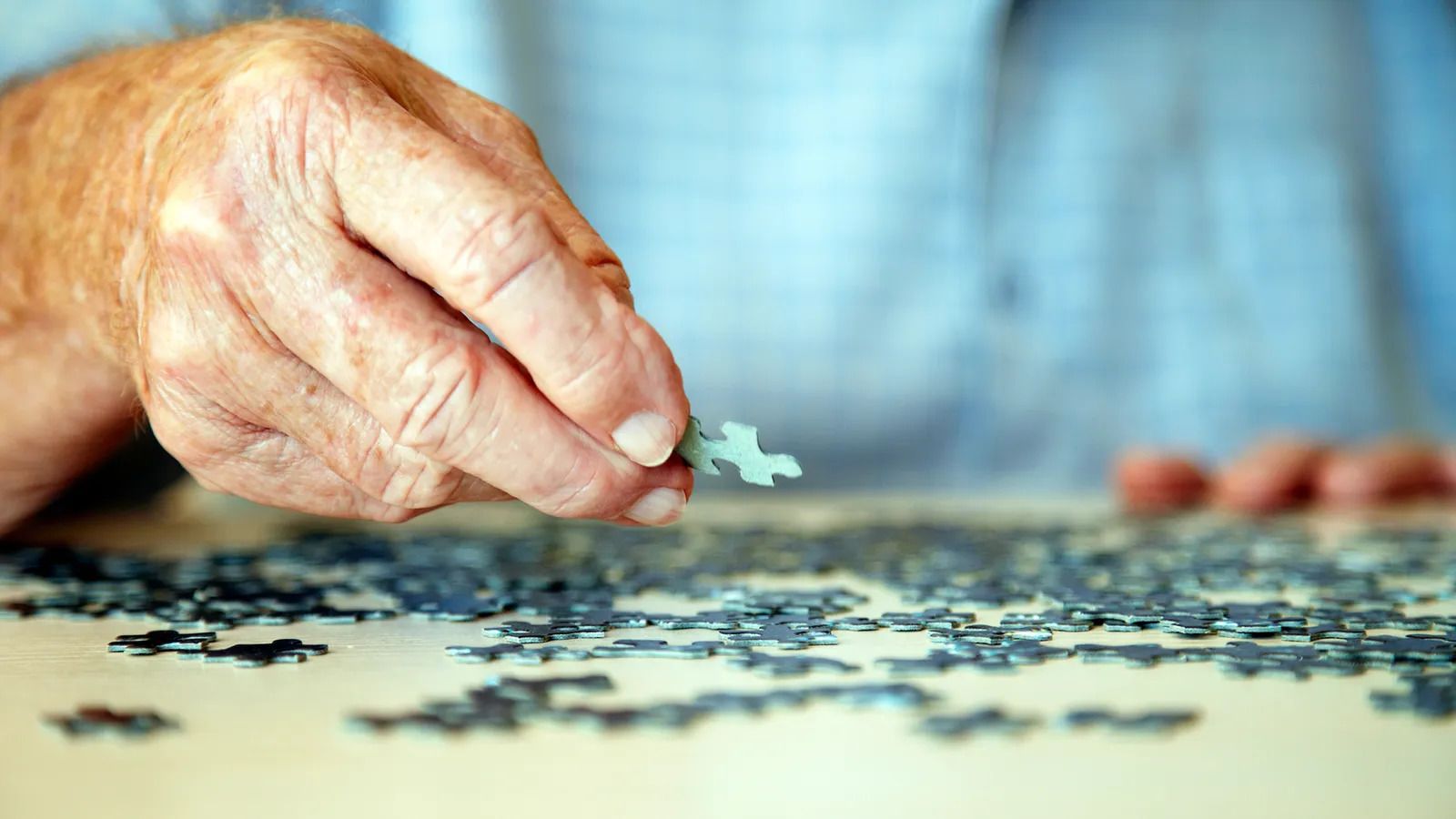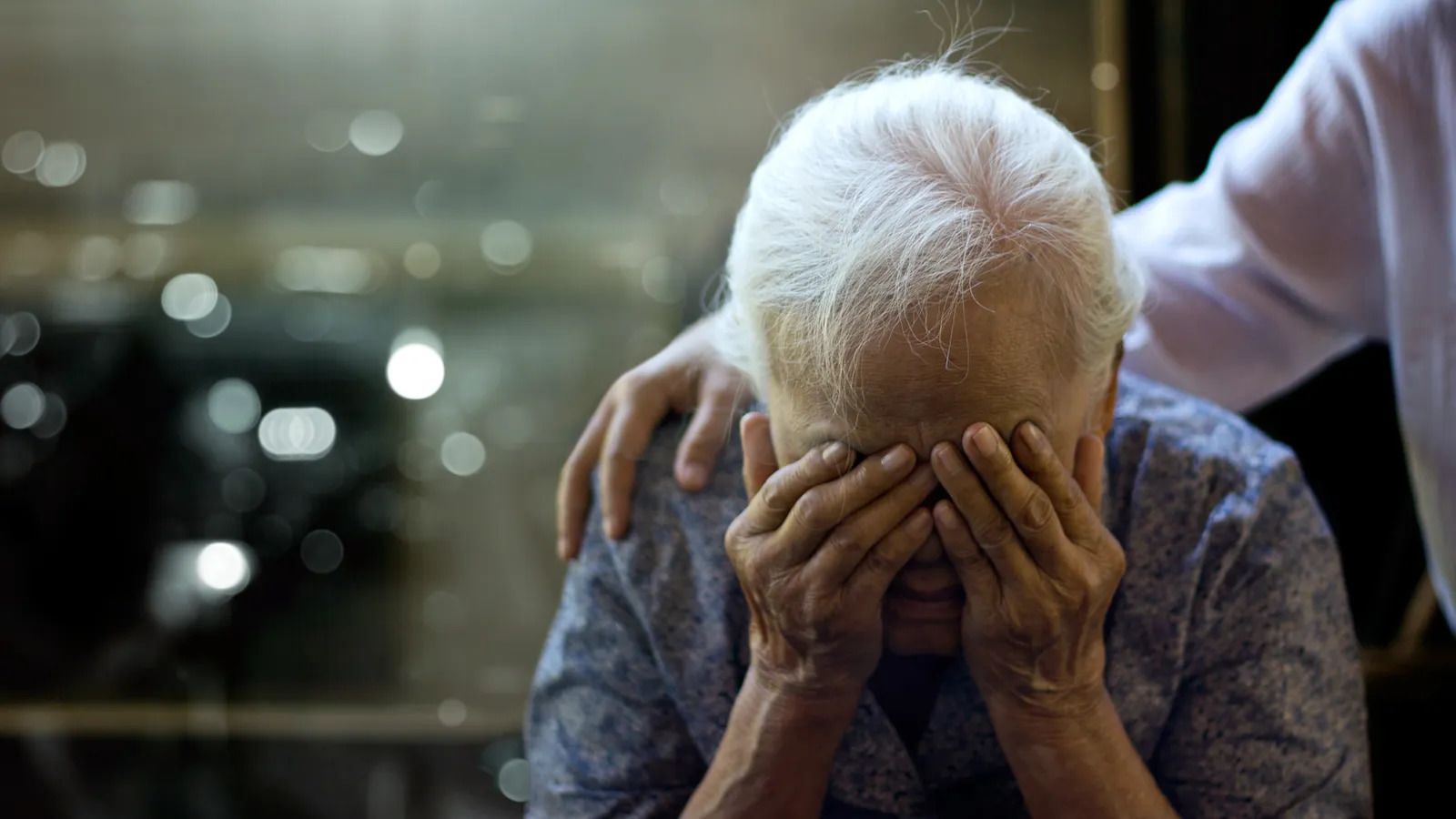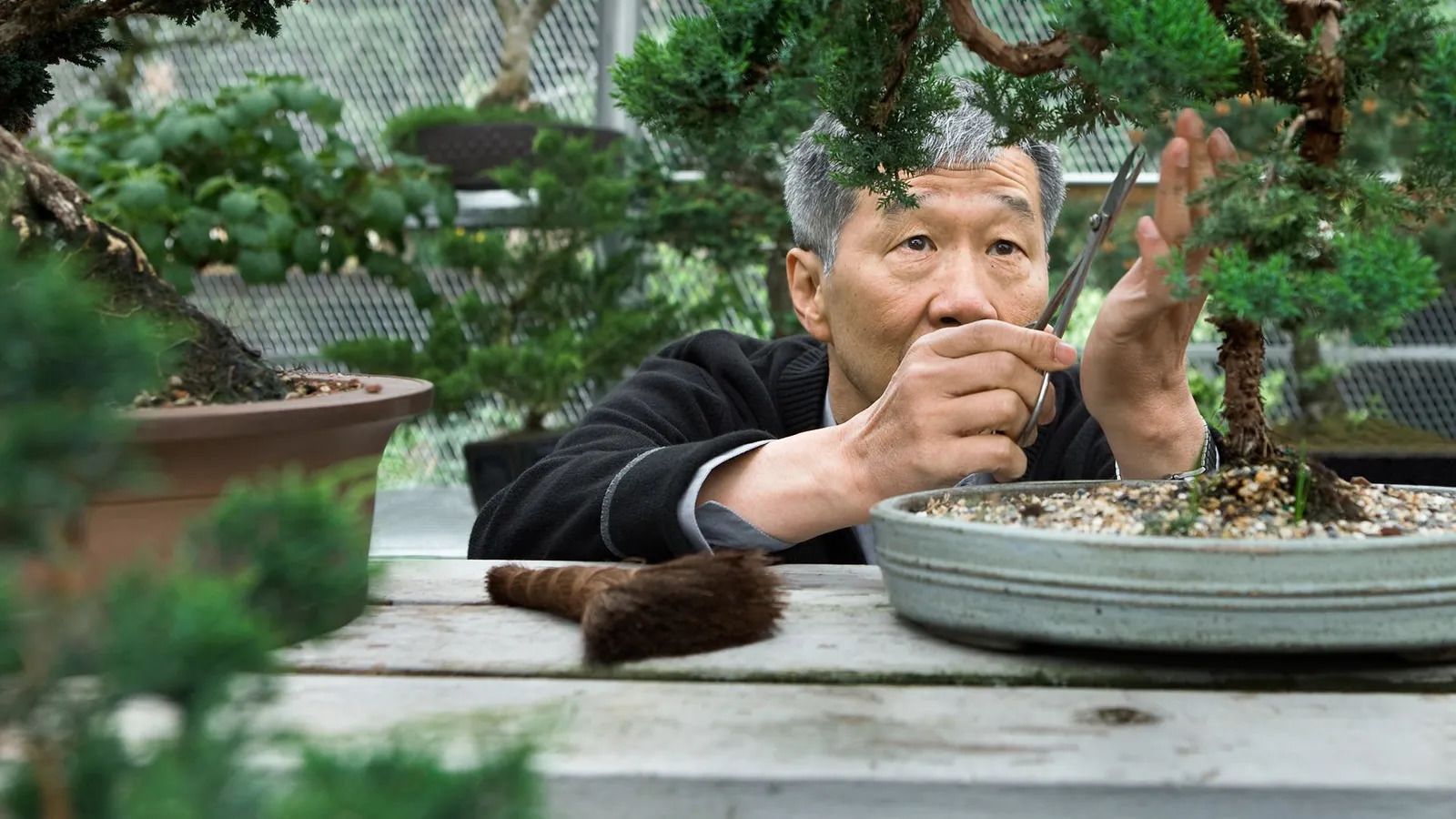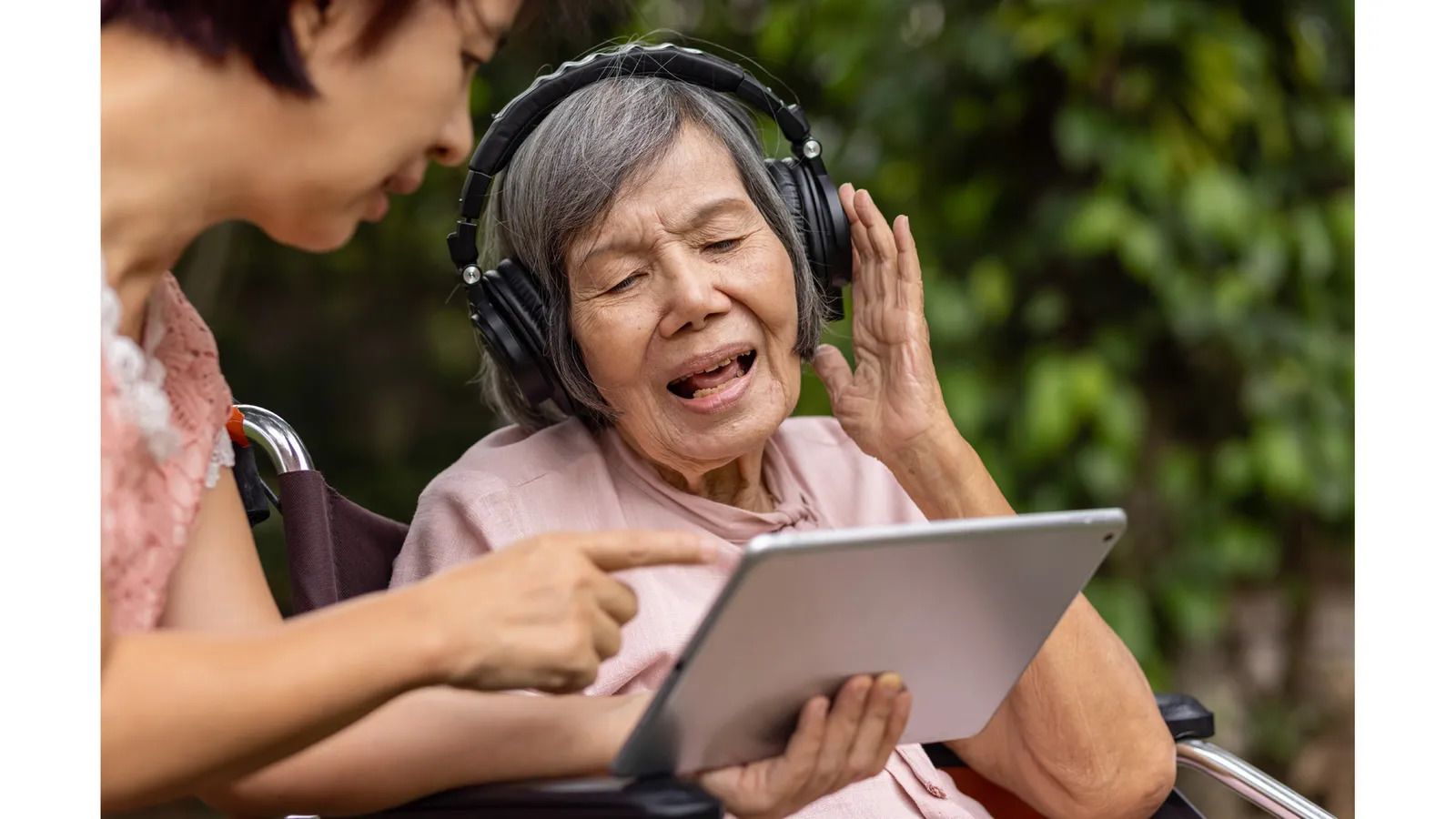
How to confront a parent's dementia
Dementia is a destroyer of worlds.
It erodes, alters and steals memories. It causes loss of concentration, confusion and mood changes. It turns familiar faces and previously simple everyday actions into incomprehensible puzzles.
Those who witness a loved one's mental decline are also affected. One study called informal or family caregivers "the invisible second patients". Their experiences ranged from social isolation, stress and increased health risks to financial problems.
If the loved one with dementia is your mother or father, it also rewires and reverses one of the most important connections in our lives.
My new parent-child bond began on Christmas Day, 2019.
An artificial tree, suffering from an overdose of tinsel, stood in the corner of the room. My husband sported a garish sweater. Our student son played cards and stifled a yawn. His grandfather – my dad – tucked into a traditional turkey dinner. So far, so seasonal. The only difference that time was the location: the Lister Hospital in Stevenage, a town just north of London.
My then 87-year old father had been admitted 24 hours earlier ill, confused and vomiting what appeared to be black coffee granules. This was not – as he later joked with nurses – a result of my cooking. Instead, tests revealed a cause that mystified us all: an overdose of painkillers.
I was even more surprised by the doctor's next revelation: "How long has your father had dementia?"
"As far as I'm aware," I replied, "he hasn't got dementia."
 The symptom most commonly associated with dementia is memory loss, which
occurs as brain cells stop working and communicating correctly
The symptom most commonly associated with dementia is memory loss, which
occurs as brain cells stop working and communicating correctly
Around 57 million people worldwide have dementia. That number is expected to triple to 153 million cases in 2050, according to a forecast by an international team of researchers, due to an ageing, growing global population. Dementia also affects disproportionately more women than men and is not, as commonly assumed, a disease.
"Dementia is an umbrella term for a range of progressive conditions that affect the brain," says Caroline Scates, deputy director of admiral nurse development at the charity Dementia UK.
These changes in the brain are caused by different diseases. "There are over 200 different types of dementia," says Scates. "The most common are Alzheimer's disease, vascular dementia, Lewy body dementia, frontotemporal dementia and mixed dementia – all of which can present in varying ways."
Lewy body dementia, for instance, results from protein clumps inside brain cells called Lewy bodies with symptoms including hallucinations, sleepiness and fainting.
The first dementia symptom that is usually noticed by people and their loved ones, however, is memory loss. This is caused by brain damage because when our brain cells stop working properly, it affects our thoughts, memory and ability to communicate.
"Once someone experiences dementia doctors don't have anything out there preventing the course of the disease," says Rosa Sancho, head of research for the charity Alzheimer's Research UK. "People can take drugs, but that will only alleviate symptoms temporarily."
Because the underlying diseases are currently incurable, the only solution for now is to manage the symptoms, provide an environment that supports and stimulates the remaining brain function, and – more on this later – take steps to lower the risk of developing dementia in the first place.
"A diagnosis of dementia is given not just to one person," says Scates. "It is given to a spouse, a partner, a child, the extended family and friends so there is an impact on the whole family. Every time a diagnosis is made it is life-changing for several people."
 Dementia is under-diagnosed worldwide, often because people avoid
seeking medical help due to the fear that surrounds the condition
Dementia is under-diagnosed worldwide, often because people avoid
seeking medical help due to the fear that surrounds the condition
For those caring for dementia sufferers, the loss of memory can turn everyday life into a never-ending series of mysteries to be solved.
In my father's case, there was the puzzle of why he had ingested an overdose of painkillers. Then I recalled that, a few days before, he'd been limping when I collected him at the train station. It turned out that he had broken his foot slipping off a kerb several weeks earlier.
"Did they not give you a cast?"
"Oh yes, but it was getting on my nerves," he said. "I'm fine."
The hospital doctor conjectured that Dad had been taking something for the pain but accidentally overdosed because he could not remember having taken any medication. Dad’s suitcase confirmed this theory. Inside I found more than 10, mostly empty, packets of painkillers.
It is easy to dismiss some signs of dementia as age-related 'senior moments'. Dad had always been forgetful and absent minded – traits I've inherited – so I had mentally smoothed over his memory lapses, convinced that constantly losing his phone was normal for someone in their 80s.
In other areas, he was doing great for his age. He read the Times newspaper daily and was an avid watcher of TV news. He loved discussing politics, travelled everywhere by bus or train, walked six miles daily and went to every home game of his favourite football team, Everton (although I'm not sure this helped his mental health).
Sure, the family heard the same stories increasingly on repeat. And on one occasion he popped out to the local shops, got lost and returned three hours later. But no harm was done and he simply laughed about it.
For many adults dealing with a forgetful parent or partner, an accepting approach may feel respectful and sensitive. But ignoring early signs has become a major public health problem worldwide, since dementia is under-diagnosed.
"A 2017 review showed that globally the rate of undetected dementia was 62%," says Elizabeth Ford, a senior lecturer in the Department of Primary Care and Public Health at the Brighton and Sussex Medical School. "So only 38% of global cases are being diagnosed."
Ford attributes the lack of a cure or disease-altering treatment as one of the main reasons why people may avoid seeking a medical opinion, as well as the fact that it is a "highly stigmatised and bleak" diagnosis. "Half of UK adults say it is the condition they fear getting the most," she says, "and GPs tend to wait as long as possible before referral for diagnosis. They tread carefully, making sure their patient is ready for the long battery of tests and for hearing the outcome, as not every patient wants to know if they have dementia."
 An early diagnosis can be empowering for adults with dementia and their families, helping to improve quality of life
An early diagnosis can be empowering for adults with dementia and their families, helping to improve quality of life
Diagnosis rates are lowest in poorer countries. Unequal access to healthcare is one big reason for this, but even where dementia assessment is widely available, people can be in denial, or feel there is no point.
Some spouses, friends or relatives of adults with dementia create what is known as a 'bubble of normalisation': trying to justify their loved one's increasingly erratic behaviour, out of the fear that confronting reality will cause the person pain or shock, as well as unhappiness over the inevitable loss of independence.
Yet evidence suggests that an early diagnosis can ultimately be reassuring and empowering for adults with dementia and their families, and improve quality of life, by allowing them to plan for care and find emotional and mental health support. National dementia strategies have made early diagnosis a priority.
For my family, the warning signs should have started flashing when Dad wrongly insisted that a relative had removed all the money from his bank account. No matter how many times I showed statements or accompanied him personally to the bank for reassurance, the agitation and anger would emerge afresh. Sometimes, before we'd even returned home. "I'm sorry to bother you, Sue, but I think someone's been stealing my money…"
Then there was an iron left plugged in, burning a cartoon-style silhouette on the ironing board. A gas ring not switched off properly. Thank goodness he didn't smoke. Instead of heeding the signs, I reassured myself that I've done all these things too. I was a fool, through a lens of love, to not accept the obvious.
Then, in the summer of 2019, he was put on a morning train by one of his grandchildren at Chester, near his home, heading to London, near where I live. Unfortunately, it was a day of rail chaos with broken down trains and hundreds of people crammed beneath notice boards saying delayed or cancelled. I waited for him at the train station in London. But 12 hours later he still hadn't arrived. I called the police. They eventually located him arriving back at his own home at 3am.
When I spoke to him over the phone, despite never actually reaching our house, Dad thanked me cheerfully for a lovely weekend.
As a parent, Dad has always given me unconditional love and endless support and so at first I reverted to my normal position – eldest daughter mode
The tectonic plates in our relationship shifted that day, but I remained in denial. As a parent, Dad has always given me unconditional love and endless support and so at first I reverted to my normal position – eldest daughter mode. Growing up with five younger siblings, I felt, produced a useful skillset for supporting my newly dependent Dad. I organised, supervised, checked up on him and sent regular reminders of things to do.
"No wonder they called you bossy," he snorted cheekily.
There is some evidence that this tendency to take charge is in fact particularly common in firstborns, though other studies have found that birth order does not have much of an impact on life choices, nor on how people cope with stressful events. So it may have partly just been my personality. I like being in charge.
In fact, a growing body of research reveals how family dynamics can profoundly shape dementia care. Experts believe knowing the complex interplay of feelings such as guilt, denial, grief, rivalry and fear in families ravaged by dementia, could help both patients and their relatives.
"Seeing behaviour change in someone you have known for a long time can be stressful," says Scates. "However, starting to learn what is behind the behaviour can help to understand what that person might need or is trying to communicate."
After the accidental overdose, I arranged to see my father's doctor. With Dad's consent, she revealed he had been diagnosed with Alzheimer's disease in 2017. He had kept the diagnosis secret from us all.
We never discussed his reasons for not telling us. Dementia patients have said in studies that talking about the diagnosis can be difficult, also because they may still be coming to terms with it themselves.
But the full chaotic picture he had tried so hard to conceal revealed itself in his flat. It was in disarray, littered with unpaid bills and red-stamped threats from utility companies. The fridge was the biggest shock, filled with rotting food that he'd bought but forgotten to cook.
Fortunately, Dad had already entrusted me with the ability to manage his affairs on his behalf via a solicitor. I now had to make decisions in his best interests. It meant rewriting the parent-child relationship yet again. I was effectively his guardian. He was my dependent.
I had become my father's parent.
 Research has found links between time spent on household chores such as gardening and a reduced risk of dementia
Research has found links between time spent on household chores such as gardening and a reduced risk of dementia
One personal barrier remained. Dad had always said: "Promise me, Sue. Don't ever put me in a care home."
Just writing that prompts tears and physical pain because I couldn't keep my promise.
First my father entered a short stay care home for a full assessment of his needs. It was March 2020. Two days later the UK announced its first lockdown. Instead of two weeks, he remained there for six months.
Clearing out his flat was depressing. It was like sorting through someone's possessions after they'd died – yet he was still alive. Just not as I once knew him. I had Schrödinger's Dad.
My guilt escalated when Covid-19 ripped through care homes in the UK and around the world. Dad contracted the disease in his care home and, amazingly, shook it off within days. But I was concerned for his mental health. A social man, he could no longer see family or friends in person under lockdown or when there were Covid outbreaks or restrictions at the home. When visits resumed, I drove over 200 miles to see him for 30 minutes behind a glass window. We couldn't even hold hands.
"We know from before the pandemic that social isolation is a risk factor for dementia," says Sancho. "When people are socially active and connected with the community it's good for their brain health, communication and social skills. Social isolation is not good for someone's brain health."
The next year was a period of relentless doubt, not least because I was simultaneously negotiating my own (eventual) diagnosis of autism. At some in-person visits, he was almost his normal self. Other times, he could barely speak and I would hold his hand and play Puccini, one of his favourite composers. (Learn more about how music can help dementia patients.)
But there were glimmers of hope, too, if not for us, then for future families dealing with dementia. I discovered that the Netherlands pioneered a 'dementia village' in 2009, set up by two nurses who wanted a different experience for their own elderly parents. Over 150 people with dementia now live in Hogeweyk, a gated community that artificially recreates a village-type environment with a supermarket and restaurant staffed by carers.
Last year a private company, Richmond Villages, used the Dutch model to set up the first 'dementia village' of its kind in the UK, on a much smaller scale, with six individual flats, and carers on hand to help where necessary.
"We try to get them to prepare their own food within the apartment and their washing – like living at home," says managing director Philippa Fieldhouse.
This independence has shown surprising benefits, according to Fieldhouse: "They're so much more relaxed and there are much more interactions," she says. "We've had families come in and discovered their relatives baking and gardening again. We're finding we can care for them better too as they're content and more settled."
 Music is often used as a form of therapy for dementia patients as it can re-awaken memories
Music is often used as a form of therapy for dementia patients as it can re-awaken memories
A new observational study by Chinese researchers found a link between more time spent on household chores, exercise and social visits and a reduced risk of dementia. A healthy lifestyle, especially among older people, is also thought to lower the risk of developing dementia in the first place.
If you know anyone with dementia, it certainly makes you reassess your own lifestyle and prospects when older. While the causes can be varied and complex and nothing guarantees protection, there are risk-reducing measures. These include an active social life, addressing any hearing problems, not smoking or drinking excessive alcohol, and being physically and mentally active.
This can be hard to accept when your own active, healthy, sociable parent – like mine – is nevertheless affected. Though I now regret not being even bossier because he always refused to address his hearing issues. But one comforting thought is that perhaps his lifestyle helped keep his brain in good health for longer, even if it did not eliminate the threat.
So far, Dad continues to recognise me although his words emerge slowly like soap bubbles which rise and dissipate suddenly into the air as he struggles to maintain his train of thought. But I am aware that one day, my face will become that of a stranger. The kind care workers are already his surrogate family. On a recent visit, I found him in a communal area listening politely to an organised nostalgic sing along, probably intended to stir old memories – including a once popular but perhaps over-used British wartime tune, We'll Meet Again.
When he saw me, Dad got up immediately, delighted.
Walking towards his room, I suggested playing one of his opera or classical music CDs. "Anything," he replied with a smirk, "as long as it's not We'll Meet Again."
For a wonderful moment the Dad I'd once known had returned and I was, briefly, just his daughter once more.











